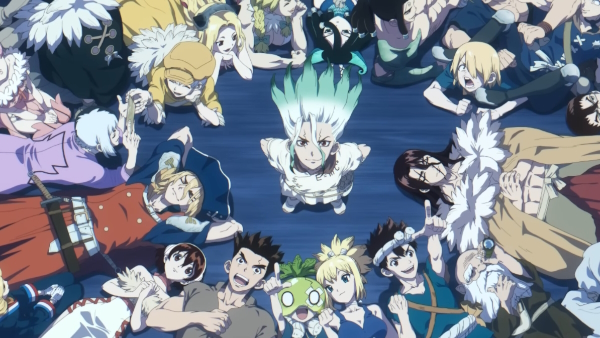
In a world turned to stone, one genius teenager is determined to rebuild civilization from scratch using nothing but science. But how realistic is the science behind Dr. Stone, and what can we learn from this unique anime?
Have you ever wondered what it would take to rebuild civilization from zero? Not just restarting society, but literally recreating thousands of years of scientific progress—from making fire all the way to developing antibiotics and communications technology? That's the fascinating premise behind "Dr. Stone," an anime and manga series that's captured the imagination of science enthusiasts worldwide.
The Scientific Journey Through the Stone World
Dr. Stone follows Senku Ishigami, a brilliant teenage scientist who awakens 3,700 years after a mysterious flash of light turned all of humanity to stone. Armed with nothing but his encyclopedic knowledge of science and his unwavering determination, Senku sets out to restore civilization through the power of scientific discovery.
What makes Dr. Stone truly special isn't just its post-apocalyptic setting or engaging characters—it's the show's remarkable commitment to scientific accuracy and educational value, all while telling an entertaining story.
Senku's Scientific Method: More Than Just Entertainment
Unlike most science fiction that handwaves away the details, Dr. Stone embraces them. Senku doesn't just say "let's make batteries"—he walks us through collecting manganese dioxide from specific rocks, finding zinc, creating containers, and assembling the components. The show transforms potentially dry scientific concepts into exciting challenges with real stakes.
What's impressive is how the series uses the scientific method as a narrative device:
- Identify a problem (need medicine, communications, weapons)
- Form a hypothesis about a solution
- Test the hypothesis through experimentation
- Analyze results and adjust approaches
- Implement successful solutions
This process isn't just background detail—it's central to the storyline. When Senku needs to create antibiotics to save lives, we witness both the triumphs and failures along the way.
The Technological Progression: Stone Age to Modern Science
Dr. Stone's greatest strength is how it demonstrates the interconnected nature of technological advancement. Senku can't just jump to creating a cellphone—he needs to:
- Master fire-making and basic tools
- Develop pottery and glassmaking
- Create soap and alcohol for sanitation
- Discover how to generate electricity
- Mine and refine various metals
- Produce chemicals for batteries and other components
Each discovery builds upon previous ones in a believable progression. This teaches viewers something profound: our modern world wasn't built overnight, but through thousands of incremental scientific advancements, each dependent on what came before.
Beyond Senku: The Human Element of Science
While Senku is the scientific genius of the show, Dr. Stone cleverly illustrates that science is a collective human endeavor requiring diverse skills:
- Kaseki: The elderly craftsman whose skilled hands can create the delicate items Senku designs
- Chrome: The self-taught "sorcerer" who collected minerals and made observations without formal education
- Gen Asagiri: The mentalist who applies psychological science to help navigate human relationships
- Kohaku: The hunter whose physical abilities make difficult material collection possible
This ensemble approach demonstrates that science isn't just for isolated geniuses—it requires collaboration between people with different talents and perspectives. As Senku often says, science is the story of human advancement built over generations.
The Balance of Scientific Accuracy and Creative License
Let's be honest—while Dr. Stone gets a lot of science right, it also takes creative liberties for the sake of entertainment. Some chemical reactions happen impossibly fast, certain calculations are simplified, and Senku's memory is supernaturally perfect.
But these exaggerations serve a purpose: making science exciting without losing the core educational value. The fundamentals remain sound, even when the execution is dramatized for storytelling purposes.
What We Can Learn From Dr. Stone's Scientific Approach
The brilliance of Dr. Stone lies in how it makes viewers appreciate:
1. The Fragility and Resilience of Human Knowledge
One of the most poignant aspects of Dr. Stone is how it illustrates both the vulnerability and durability of scientific knowledge. When civilization collapses, so does most of humanity's accumulated wisdom—yet through Senku's memorized knowledge and scientific reasoning, it can be rebuilt.
This serves as a powerful reminder of how precious our scientific understanding is, and how important it is to preserve and share knowledge.
2. The Value of First Principles Thinking
Senku doesn't rely on memorized formulas alone—he understands the fundamental principles behind scientific concepts. This "first principles thinking" allows him to adapt and innovate when faced with limited resources or unexpected challenges.
In our own increasingly complex world, this approach to problem-solving—breaking things down to their fundamental truths and reasoning up from there—is invaluable.
3. The Connection Between Theoretical and Practical Knowledge
The show beautifully illustrates how theoretical knowledge must be paired with practical skills. Senku's encyclopedic knowledge would be useless without the craftspeople who can implement his designs or the gatherers who can locate needed materials.
In an educational landscape often divided between academic and vocational paths, Dr. Stone makes a compelling case for valuing both equally.
Science Education Through Entertainment: Why It Works
Dr. Stone represents a masterclass in educational entertainment. Rather than lecturing viewers, it invites them into the excitement of discovery. The scientific explanations are woven naturally into high-stakes situations where understanding the science is crucial to the characters' survival.
This approach taps into something education researchers have long understood: people learn best when information is contextualized, emotionally engaging, and immediately applicable. By making science the hero of its story, Dr. Stone inspires curiosity in ways traditional education sometimes struggles to achieve.
The "Senku Effect": Inspiring Real-World Interest in Science
Since the series began, science educators have noticed what some call the "Senku Effect"—students showing renewed interest in chemistry, physics, and engineering concepts after watching Dr. Stone. Teachers report students asking questions directly related to processes shown in the anime, from simple chemical reactions to more complex engineering challenges.
This phenomenon speaks to the power of storytelling as an educational tool. When scientific concepts are presented as exciting adventures rather than dry textbook material, they capture the imagination and inspire deeper engagement.
Looking to the Stone World Future
As Dr. Stone continues its story, it raises fascinating questions about the relationship between scientific advancement and human society:
- What technologies are truly essential for human flourishing?
- How do we balance scientific progress with ethical considerations?
- What role do different types of knowledge play in building civilization?
- How do we ensure scientific knowledge benefits everyone, not just a privileged few?
By exploring these questions through compelling storytelling, Dr. Stone does more than entertain—it encourages viewers to think critically about our own relationship with technology and science.
Conclusion: The Stone World's Lasting Impact
In an era where science literacy faces numerous challenges, Dr. Stone stands as a powerful reminder of what makes science truly magical: not mystical powers, but the cumulative effect of human curiosity, perseverance, and collaboration across generations.
Whether you're a science enthusiast or someone who struggled with science classes in school, Dr. Stone offers an accessible entry point into appreciating the wonders of scientific discovery. It reminds us that at its core, science isn't about memorizing formulas—it's about observation, experimentation, and the human drive to understand and improve our world.
For those who haven't experienced this unique series yet, I encourage you to give it a try. And for educators looking to spark scientific curiosity in their students, Dr. Stone might just be the perfect laboratory assistant.

Have you watched Dr. Stone? What scientific concept from the show did you find most fascinating? Share your thoughts in the comments below!
This article explores the unique approach to science in the anime Dr. Stone, examining how the series makes scientific education entertaining while maintaining surprising accuracy in its depiction of rebuilding civilization from scratch through scientific methodology.
